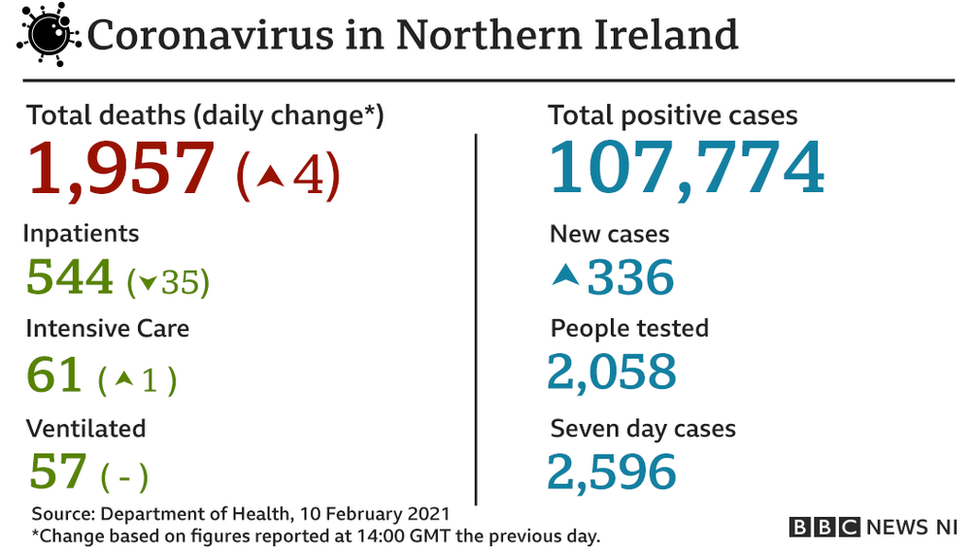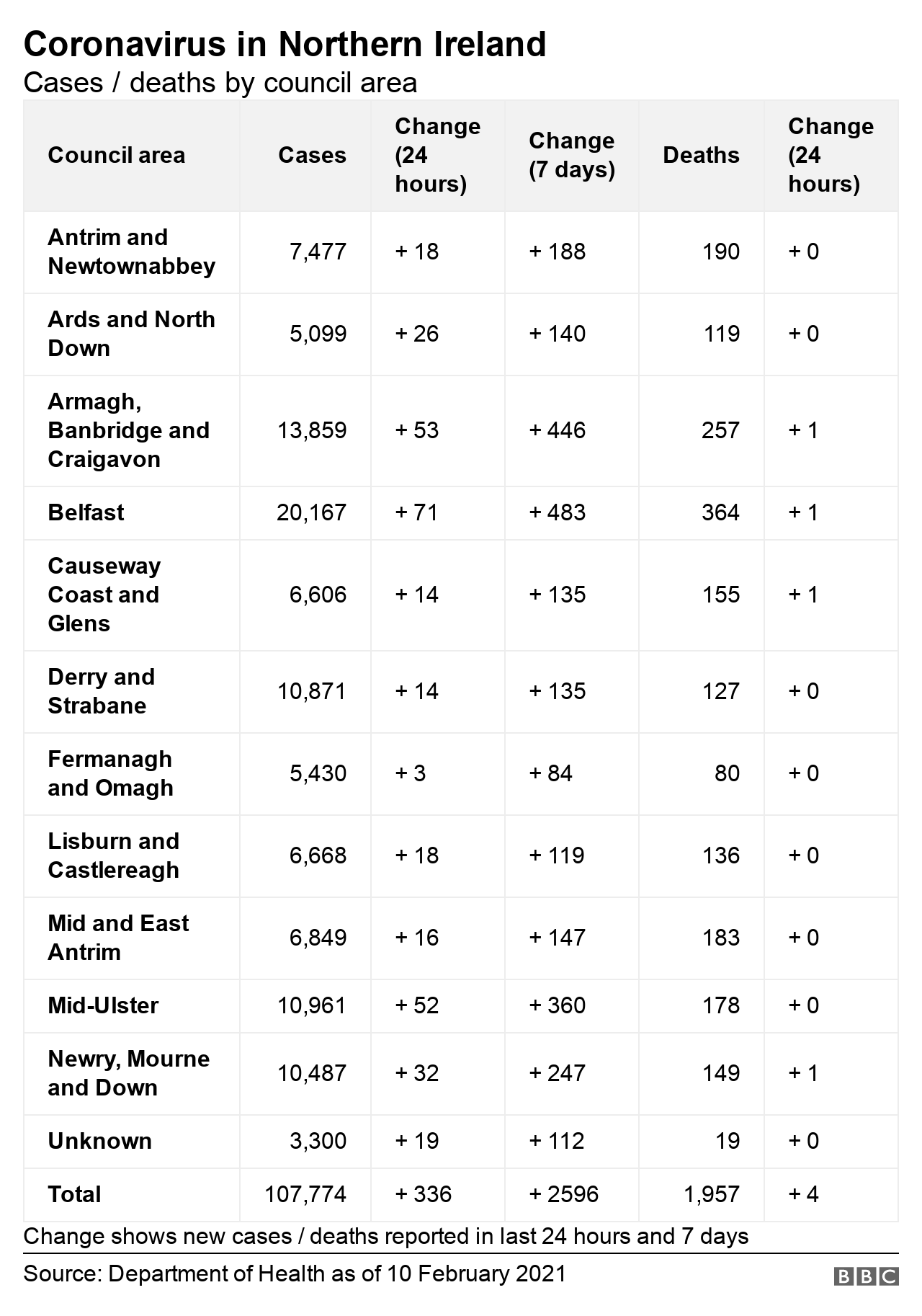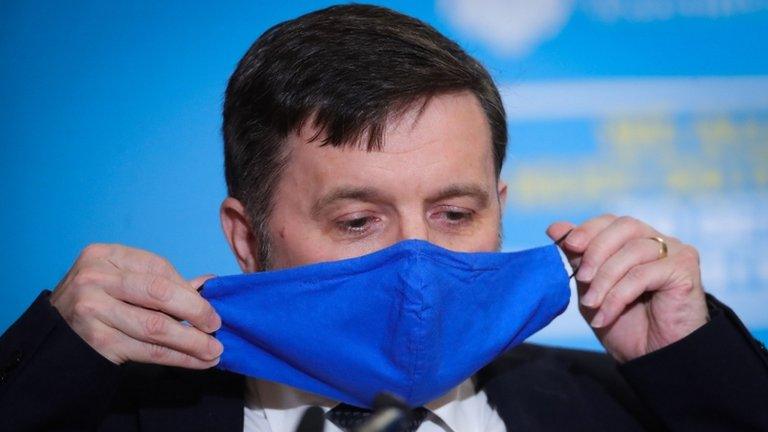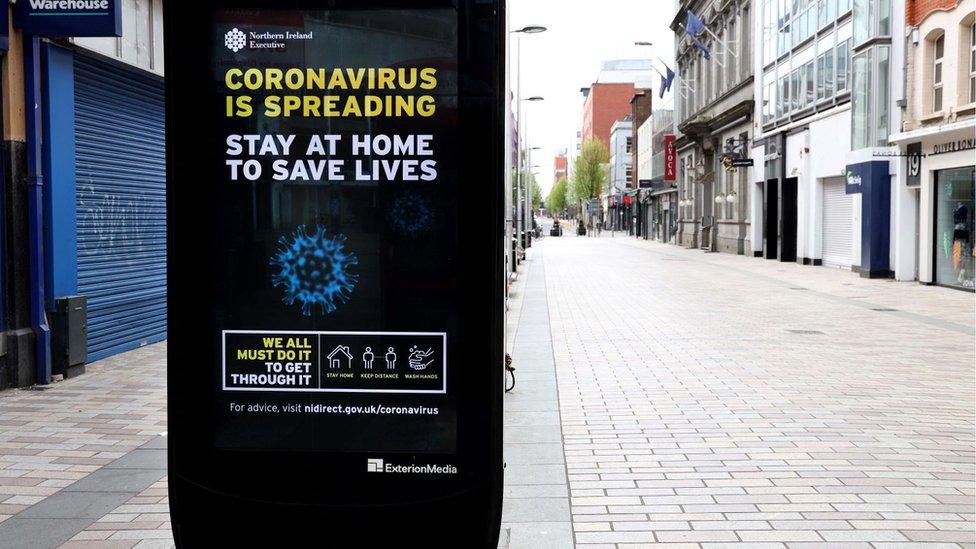Covid-19: Robin Swann says NI must tread carefully to end lockdown
- Published

Health Minister Robin Swann was speaking at a Stormont press conference
NI must "tread carefully" when it comes to easing the coronavirus lockdown and some restrictions may remain in place long term, Robin Swann has said.
The health minister said that despite progress with vaccinations, serious uncertainties remain about the future.
His comments came amid warnings from health officials that some restrictions could remain in place until next year.
"If we want a better spring and summer, we need to make the utmost effort now," added Mr Swann.
Northern Ireland re-entered lockdown on 26 December, as hospitals faced severe pressures in managing a third wave of the virus.
The executive will review the restrictions next week but the measures are currently in place until 5 March.
Four more coronavirus-related deaths have been reported in Northern Ireland, according to the Department of Health.
A total number of 1,957 people have now died in Northern Ireland after testing positive for the virus.
A further 336 positive coronavirus cases were also recorded on Wednesday in the department's latest figures.
There are 554 people being treated in hospital for the virus in Northern Ireland, 61 are in intensive care units (ICU).

There are 554 people being treated in hospital for the virus in Northern Ireland, 61 are in intensive care units (ICU).
Speaking at the weekly health press conference at Stormont on Wednesday, Mr Swann said he wanted to offer people hope but had to "stress the need for caution".
Wearing face coverings in shops and on public transport may remain the "new normal" even if lockdown measures are eased, he added.
"If we continue with the progress we are making, we can consider a careful, managed, easing of some measures - but only when and if the timing is right," Mr Swann warned.
The minister set out three "principles" he said would guide the executive's response to easing restrictions in the coming months.
They are:
Infection rates falling further and pressures in hospitals being "significantly eased"
Being aware of the risks and uncertainties with new variants of the virus
Understanding the toll the pandemic is having on the economy and society
Mr Swann said he wanted to "aggressively stamp down" infection rates, in order to allow breathing space for all aspects of society to recover.
'History must not repeat itself'
On new variants of the virus, he said they represented a considerable unknown and that ministers could not prematurely end lockdown and risk "falling into another in a small number of weeks".
It is believed at least 50% of current Covid-19 cases in NI could be related to the variant that was detected in Kent before Christmas.
It is thought to be about 50-70% more infectious than the original Covid-19 strain that emerged early last year.
He pointed to upcoming St Patrick's Day and Easter holidays and said history could not repeat itself by allowing increased social mixing to cause a large spike in cases.
Mr Swann said he longed for the day when all families in Northern Ireland could enjoy freedoms they previously took for granted, but stressed "we are not there yet".


Wednesday's Department of Health press briefing was a cooling of the jets after comments by Dr Michael McBride on Tuesday which left some thinking we would be living in lockdown well into next year.
Dr McBride and the health minister made it clear that "some restrictions may be with us into the long term" but that did not mean lockdown is here to stay.
With the public hanging onto every word during these dark times, clarity in these press conferences is essential.
Never before have words, dates and timings been so forensically scrutinised.
Wednesday's message was about stepping out of this lockdown "slowly and gently", "baby steps" rather than giant leaps.
While both men acknowledged that the public are "fed-up" and "weary" they also recognised we cannot be led out of one lockdown so quickly that "we end up falling into another in a matter of weeks".
St Patrick's Day and Easter are social stumbling blocks. While it's the executive who will decide what happens next, the minister said history must not be allowed to repeat itself (a nudge to re-opening at Christmas).
Considering that it's likely health officials will advise that very little will re-open before Easter, the big question is if that that will include schools.
With several sectors in the mix, including education, hospitality and close contact services, the plan, it seems, is to open one at a time and measure the success or damage before proceeding with the next.
All eyes will be on the R number - the aim is always to keep it below 1. As the gentlemen both said, it will be slow and gentle baby steps.

As of Tuesday, 361,430 doses of the vaccine had been administered in Northern Ireland.
The minister said the vaccination programme was making "real progress" and more than 90% of people aged over 80 in NI have now received a dose, along with 80% of those aged 75 to 79.

Northern Ireland's Chief Medical Officer Dr Michael McBride said no-one was advocating for a full lockdown to continue until 2022.
"We can do better than that, and we must do better than that," he told the press conference.
But he warned that if restrictions were relaxed too early, cases would grow and that would lead to further pressures on the health service and another rise in deaths.
'Baby steps'
"We need to allow time between relaxing one thing, assessing the impact of that before then relaxing another," said Dr McBride.
He added that "small, careful baby steps" were required, but insisted "there will be a time after Covid".
Both Dr McBride and Mr Swann appealed to the public to continue following the current public health advice, insisting it would remain an important part of the strategy to manage Covid-19.
Meanwhile in the Republic of Ireland on Wednesday, an additional 54 deaths were added to official figures on Wednesday, bringing the country's overall toll of coronavirus-related deaths to 3,794.
Ireland's National Public Health Emergency Team also said there have been another 1,006 confirmed cases of Covid-19.
Related topics
- Published10 February 2021

- Published9 February 2021

- Published29 July 2021
